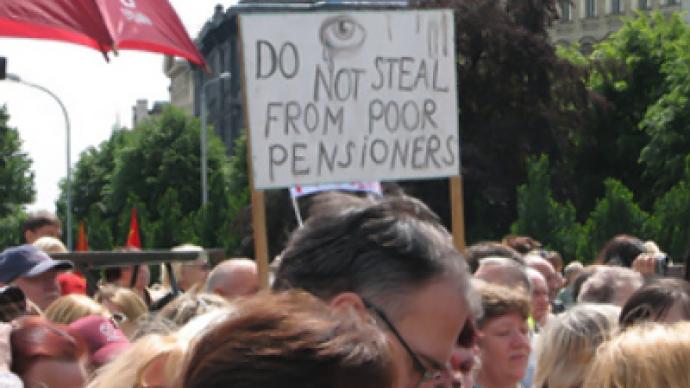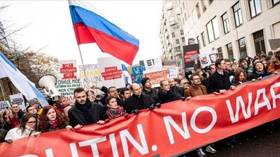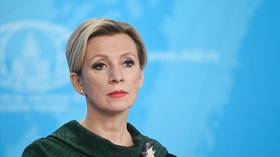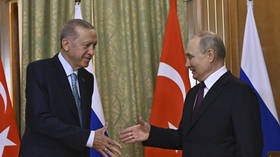Thousands rally in Latvia to stop cuts in public services

Teachers’ wages have been halved and pensions slashed by 10%. This week’s astonishing reduction in public spending is likely to be repeated and protesters have vowed to protect the country's vital services.
Under the shadow of Riga's Russian Orthodox Cathedral, a sizeable crowd gathered to listen to speeches given from the back of a truck. It was a low-key affair with the only flash point coming when Finance Minister Einars Repse made a brief appearance to talk to the crowd, only to be forced off the truck after being greeted by furious demonstrators.
The Latvian government is having to make unprecedented budget cuts, as well as tax hikes, to try and keep the Baltic nation from falling into bankruptcy. Latvia is seeking to reduce its budget deficit as part of a loan deal with the EU and IMF.
The protest organisers, the Free Trade Union Confederation of Latvia, want to make sure the nation's most vulnerable citizens do not suffer further.
‘Spring of discontent’
January’s riots in the heart of Riga’s old town, followed by violent scenes on the streets of Lithuania’s capital, sparked speculation that the Baltic states and Eastern Europe might become a hotbed for social unrest.
Riga Protests in 2009
January 13th – Protests over the Latvian government's handling of public finances turn violent in Riga. Over one hundred arrests made as a group tries to storm the state parliament.
February 3rd – Agriculture Minister Martins Roze is forced to step down after the second large-scale demonstration by farmers in 7 days.
April 2nd – Thousands of teachers and their supporters march peacefully against the government's plan to slash their wages.
May 7th – Some 1,000 noisy students congregate outside the Cabinet of Ministers Building in Riga. The government is accused of jeopardising Latvia's future by further cutting education funding.
May 12th – It is the turn of concerned parents. Hundreds of worried mothers gather to show their opposition to a cap on maternity benefits.
June 18th – The Free Trade Union Confederation of Latvia (LBAS) organises a mass rally to 'protect' the most vulnerable.
The cobbled roads of Riga have hosted a series of demonstrations since the beginning of the year, but all have been peaceful. With unemployment predicted to reach 20% in the next 6 months, and further budget cuts on the horizon, more protests cannot be ruled out.
Tiger Back in its Cage
Latvia, once the pride of the Baltic Tigers, has experienced a dramatic change in fortunes since registering the largest growth in GDP of any European Union country in 2006.
On joining the EU in 2004, Latvia was swamped by foreign credit, particularly from Swedish Banks who saw the region as an opportunity to expand. The loans were particularly directed at Latvia’s property market which, coupled with an exodus of cheap labour to the UK and Ireland, led to hugely inflated and artificial home prices.
When the global financial crisis began to gather momentum, Latvian politicians’ failure to keep growth in check looked like a disastrous error. In autumn 2008 the Latvian government was forced to go, cap in hand, to the International Monetary Fund to ask for a 7.5 billion Euro bailout package – otherwise Latvia faced bankruptcy.
The government, led by Prime Minister Valdis Dombrovskis, has since been forced to dramatically cut government spending. On June the 16th, the Riga-based parliament passed amendments to reduce the budget deficit by 500 million lats (711 million Euro).
The latest repayment of the loan is worth some 1.2 billion lats (1.7 billion Euro) and should be paid in the next few weeks, providing the Latvian government meets the requirements set by the IMF.
However, the EU has praised the Latvian government’s recent attempts to control spending while Mr Repse has expressed confidence that the next payment will be handed over.
Peter Lovegrove for RT












